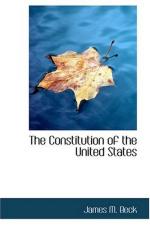Bacon, Sandys, Southampton and the Liberal leaders of the House of Commons had implanted in the ideas of the colonists the spirit of constitutionalism, which was destined to influence profoundly the whole development of the American colonies, and finally to culminate in the Constitution of the United States.
The later struggle in the Long Parliament, the fall of Charles I, and more especially the deposition of James II, the accession of William of Orange, and the substitution for the Stuart claim of divine right that of the supremacy of the people in Parliament, naturally had their reaction in the Western World in intensifying the spirit of constitutionalism in the growing American Commonwealth.
The colonial history was therefore increasingly marked by a spirit of individualism, a natural partiality for local rule, and a tenacious adherence to their special privileges, whether granted to Crown colonies, like New Hampshire, New York, New Jersey, Virginia, the two Carolinas, and Georgia, or proprietary governments, like Maryland, Delaware, and Pennsylvania, or charter governments, such as Massachusetts, Rhode Island, and Connecticut. In the three colonies last named formal corporate charters were granted by the Crown, which in themselves were constitutions in embryo, and the colonists thus acquired written rights as to the government of their internal affairs, upon the maintenance of which they jealously insisted. Thus arose the spirit in America, which treated constitutional rights, not so much as special privileges granted by plenary Sovereignty, but as contractual obligations which could be enforced in the Courts against the Sovereign.
All this developed in the colonists a powerful sense of constitutional morality, and its pertinency to my present theme lies in the fact that when each of the thirteen colonies became, at the conclusion of the War of Independence, a separate and independent nation, they were more concerned, in establishing a central government, to limit its authority and to maintain local self-government than they were to give to the new-born nation the powers which it needed. They carried their constitutionalism to extremes, which nearly made a strong and efficient central government an impossibility.
Nothing was less desired by them than a unified government. It was destined to be wrung from their hard necessities. The Constitution was the reflex action of two opposing tendencies, the one the imperative need of an efficient central government, and the other the passionate attachment to local self-rule. Co-operation between the colonies had been a matter of long discussion and earnest debate, and primarily resulted from the necessity of defence against a common foe the French in Canada, and the Indians of the forest. In 1643 four of the New England colonies united in a league to defend themselves. In 1693 William Penn made the first suggestion for a union of all the colonies. In 1734 a council was held at Albany at the instance of the Crown to provide the means for the defence against France in Canada, and it was then that Franklin submitted the first concrete form for a union of the colonies into a permanent alliance. It was in advance of the times, for, conservative as it was, it was unfortunately opposed both by the Crown and the colonies themselves.




